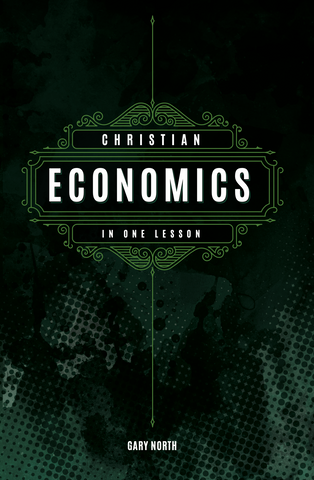Gary interviews a friend from his church about advice Dr. Gary North gave him to set himself up in a business while still holding on to his existing job.
The highest costs of government intervention into the market process are ethical costs. Most people who believe in private property recognize that the state has become immoral when it uses coercion to intervene into market exchanges. They see that the politicians have adopted this commandment: “Thou shalt not steal, except by majority vote.” Economists rarely talk about this ethical cost as the number-one cost of state intervention. They prefer to pretend that they are value-free analysts. They are not. They are merely analysts who do not believe in permanent ethical standards, especially ethical standards to which are attached predictable institutional sanctions: positive and negative.\
Economists also do not discuss the judicial principle that undergirds the concept of private property: the link between ownership and personal responsibility. Men are responsible before God judicially. They are also responsible before other bidders economically. A man who says “I will not sell” necessarily also says: “I will retain full responsibility for my ownership.” Other bidders say this by their bids: “I can do a better job as an owner.” The man who refuses to sell necessarily pays a price to retain ownership: whatever the highest bidder would have handed over to him. The free market’s pricing system forces each owner to pay the price of refusing to sell. Therefore, judicial responsibility is reinforced economically.\
There are other costs of state intervention. The main ones have to do with undermining the authority of consumers (customers) to shape the behavior of producers. Consumers reward some producers by buying. They also penalize other producers by not buying. State interference with market pricing disrupts the auction process. This intervention reduces the ability of consumers to persuade producers to do things the consumers’ way. Producers pay attention to the government’s most recent rules or the government’s most recent bids, and also its promises of future bids. Sellers honor this auction principle: “High bid wins.” When the state offers the highest bid, it wins. But then someone inescapably must lose: the taxpayer.

Christian Economics in One Lesson
Christian economics must begin with the issue of ultimate ownership. This sets it apart from modern economic analysis, which begins with the issue of scarcity. Second, this leads to the issue of theft, which in turn raises the issue of ethics.
Buy NowGary interviews a friend from his church about advice Dr. Gary North gave him to set himself up in a business while still holding on to his existing job. As usual, Dr. North’s advice is very helpful and encouraging. His point about China is spot on. Parents need to be teaching their children (and themselves) how to do things on their own and how to diagnose and fix problems. As Luke shows, it’s a skill that will continue to reap rewards.

